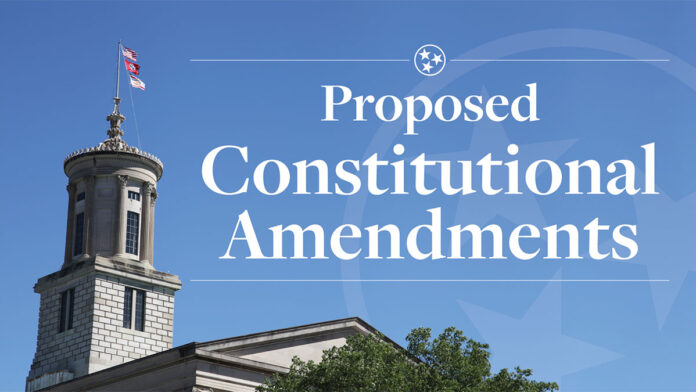 Nashville, TN – Four proposed amendments will appear on the November 8th, 2022 ballot directly after the candidates for governor. For information on amendments being considered for the 2026 ballot, click here.
Nashville, TN – Four proposed amendments will appear on the November 8th, 2022 ballot directly after the candidates for governor. For information on amendments being considered for the 2026 ballot, click here.
Proposed Constitutional amendments are presented as yes or no questions. A yes vote is a vote to amend the Constitution and adopt the proposed language in the amendment. A no vote is a vote not to amend the Constitution and keep the current language in the Constitution unchanged.
Two things must happen for an amendment to pass and become part of the Constitution. The first is the amendment must get more yes votes than no votes. The second is that the number of yes votes must be a majority of the total votes in the gubernatorial election.
This longstanding process Tennessee uses to determine the result for proposed Constitutional amendments was confirmed by a court decision following the 2014 general election.
To determine the number of votes needed to adopt a proposed Constitutional amendment, votes for all candidates for governor are added together and then divided by two. If there are more yes votes than no votes on the proposed amendment and the number of yes votes exceeds 50%+1 of the total votes for governor, the amendment passes and becomes part of the Constitution. The Constitutional amendment fails if the number of yes votes does not meet or exceed the threshold, or if there are more no votes than yes votes.
The current language of the Tennessee Constitution can be found in the online edition of the Tennessee Blue Book. The Attorney General has provided summaries for each amendment to be placed on the ballot. For questions, please call 1.877.850.4959.
Constitutional Amendment #1
As proposed by SENATE JOINT RESOLUTION NO. 648 (111th) & SENATE JOINT RESOLUTION NO. 2 (112th)
Summary:
This amendment would add a new section to article XI of the Tennessee Constitution to make it illegal for any person, corporation, association, or the State of Tennessee or its political subdivisions to deny or attempt to deny employment to any person because of the person’s membership in, affiliation with, resignation from, or refusal to join or affiliate with any labor union or employee organization.
Question:
Shall Article XI of the Constitution of Tennessee be amended by adding the following language as a new section?
It is unlawful for any person, corporation, association, or this state or its political subdivisions to deny or attempt to deny employment to any person by reason of the person’s membership in, affiliation with, resignation from, or refusal to join or affiliate with any labor union or employee organization.
Constitutional Amendment # 2
As proposed by SENATE JOINT RESOLUTION NO. 154 (111th) & SENATE JOINT RESOLUTION NO. 10 (112th)
Summary:
This amendment would add to article III, section 12 of the Tennessee Constitution a process for the temporary exercise of the powers and duties of the governor by the Speaker of the Senate—or the Speaker of the House if there is no Speaker of the Senate in office—when the governor is unable to discharge the powers and duties of the office of governor. While a Speaker is temporarily discharging the powers and duties of the governor, the Speaker would not be required to resign as Speaker or to resign as a member of the legislature; but the Speaker would not be able to preside as Speaker or vote as a member of the legislature. A Speaker who is temporarily discharging the powers and duties of the governor would not get the governor’s salary but would get the Speaker’s salary.
The amendment would also exempt a Speaker who is temporarily discharging the powers and duties of the governor from provisions in the Constitution that would otherwise prohibit the Speaker from exercising the powers of the governor and from simultaneously holding more than one state office.
Question:
Shall Article III, Section 12 of the Constitution of Tennessee be amended by adding the following language immediately following the current language in the Section?
Whenever the Governor transmits to the Secretary of State, the Speaker of the Senate, and the Speaker of the House of Representatives, a written, signed declaration that the Governor is unable to discharge the powers and duties of the office, the powers and duties of the office of Governor shall be temporarily discharged by the Speaker of the Senate as Acting Governor, or if that office is unoccupied, then by the Speaker of the House of Representatives as Acting Governor, until the Governor transmits to the same officials a written, signed declaration that the Governor is able to discharge the powers and duties of the office.
Whenever a majority of the commissioners of administrative departments of the Executive Department transmits to the Secretary of State, the Speaker of the Senate, and the Speaker of the House of Representatives their written, signed declaration that the Governor is unable to discharge the powers and duties of the office, the Speaker of the Senate shall immediately assume the powers and duties of the office as Acting Governor, or if that office is unoccupied, then the Speaker of the House of Representatives shall immediately assume the powers and duties of the office as Acting Governor, until the Governor transmits to the same officials a written, signed declaration that the Governor is able to discharge the powers and duties of the office.
Whenever a Speaker is temporarily discharging the powers and duties of the office of Governor as Acting Governor, such Speaker shall not be required to resign the Speaker’s position as the Speaker or to resign as a member of the general assembly and shall retain the Speaker’s salary and not receive the Governor’s salary, but such Speaker shall not preside as Speaker or vote as a member of the general assembly during the time the Speaker is Acting Governor.
and
Shall Article III, Section 13 of the Constitution of Tennessee be amended by adding the following language immediately before the period at the end of the Section?
except as provided in Article III, Section 12 with regard to the Speaker of the Senate or the Speaker of the House of Representatives temporarily discharging the powers and duties of the office of Governor as Acting Governor.
and
Shall Article II, Section 26 of the Constitution of Tennessee be amended by adding the following language at the end of the Section?
This section shall not apply with regard to the Speaker of the Senate or the Speaker of the House of Representatives temporarily discharging the powers and duties of the office of Governor as Acting Governor under Article III, Section 12.
Constitutional Amendment # 3
As proposed by SENATE JOINT RESOLUTION NO. 159 (111th) & SENATE JOINT RESOLUTION NO. 80 (112th)
Summary:
This amendment would change the current language in article I, section 33 of the Tennessee Constitution, which says that slavery and involuntary servitude, except as punishment for a person who has been duly convicted of crime, are forever prohibited in this State. The amendment would delete this current language and replace it with the following language: “Slavery and involuntary servitude are forever prohibited. Nothing in this section shall prohibit an inmate from working when the inmate has been duly convicted of a crime.”
Question:
Shall Article I, Section 33 of the Constitution of Tennessee be amended by deleting the section and substituting instead the following?
Section 33. Slavery and involuntary servitude are forever prohibited. Nothing in this section shall prohibit an inmate from working when the inmate has been duly convicted of a crime.
Constitutional Amendment # 4
As proposed by SENATE JOINT RESOLUTION NO. 178 (111th) & SENATE JOINT RESOLUTION NO. 55 (112th)
Summary:
This amendment would delete article IX, section 1 of the Tennessee Constitution, which prohibits ministers of the gospel and priests of any denomination from holding a seat in either House of the legislature.
Question:
Shall Article IX, Section 1 of the Constitution of Tennessee be amended by deleting the section?



